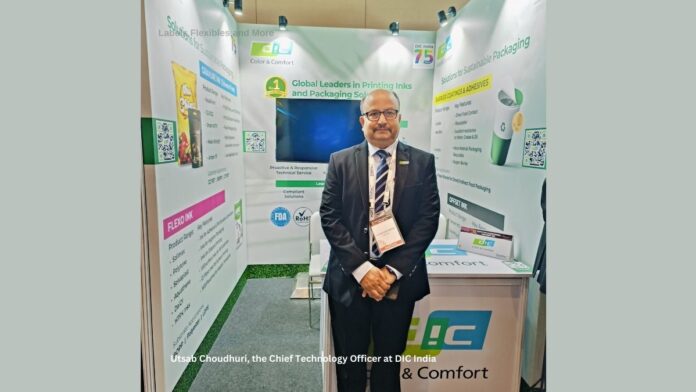At the recent Elite Plus Specialty Films and Flexible Packaging conference, DIC India showcased their commitment to sustainability with a range of innovative solutions for inks and coatings. Highlights included their water-based inks designed to reduce volatile organic compounds (VOCs) and MO-free inks suitable for food packaging. Additionally, they presented various options for toluene-free and ketone-free ink packaging. During the conference, Labels Flexibles and More had the opportunity to speak with Utsab Choudhuri, the Chief Technology Officer at DIC India, who shared insights on how these products align with the growing demand for environmentally friendly packaging solutions.
Developments at DIC India
He said, “In the ever-evolving landscape of innovation, we find ourselves on an exciting journey toward sustainability. Our commitment to creating food-safe, environmentally friendly products is guiding our development efforts. With a focus on recyclability, we are preparing to introduce a range of products that prioritize not only food-safety but also ease of recycling. In India, while toluene-free inks are widely available, we are taking a bold step further by developing PVC-free inks, set to revolutionize food packaging within the next 2 to 5 years. This forward-thinking approach doesn’t stop there; we are also embracing water-based technology to craft inks that are free from both toluene and ketones, ensuring a significant reduction in volatile organic compounds (VOCs). With every innovation, we are not just anticipating the needs of our industry but also paving the way for a sustainable future.”

MD & CEO
DIC India,
Utsab da & Dr. Kamakshi Christopher
GM- Flexible Packaging
“Currently, traditional packaging structures comprise three layers, specifically polyester, metalized polyester, and poly with conventional adhesive, which pose challenges for recycling. To address these issues, we are transitioning to a more sustainable approach by creating a two-layer structure using BOPP and metallic CPP with a barrier adhesive. This new design will not only simplify recycling processes but will also reduce waste. Additionally, we are exploring poly-poly and BOPP-BOPP structures to further advance our efforts in sustainable packaging solutions.”
“We are currently focusing on three main types of coatings. The first is an oxygen barrier coating, which aims to reduce the layer for enhanced preservation. Next, we are developing a direct food contact coating specifically designed for food packaging, ensuring safety and compliance. Additionally, we are working on a coating for heat seal applications, which will also cater to the packaging industry. At present, we are conducting trials on these three coatings, and we aim to regularize production in India by 2025.”
India: A Growth Potential Market
“The packaging industry is experiencing a significant shift towards sustainability, with companies actively working on innovations that reduce material usage and enhance recyclability. In India, there is notable progress in sustainability efforts, including initiatives to remove inks from plastics, allowing for the reuse of these materials as virgin plastic. Recent data shows that flexible packaging is growing at a rate of approximately 7 to 8%, while commercial packaging growth has slightly declined. This focus on sustainable practices is essential as the market continues to evolve.”
“Raising awareness about food safety and environmental issues is essential for fostering a healthier society. It is important to educate individuals that these factors are not obstacles but rather vital components that contribute to overall well-being and sustainability. As we observe the rapid growth of Asia, particularly in countries like India and China, it becomes clear that this region is outpacing the US and Europe. Notably, India’s younger population presents significant opportunities for growth compared to China, suggesting a more promising economic future for India. By prioritizing food safety and environmental education, we can ensure that this growth is not only robust but also sustainable for generations to come.” Utsab Concludes.
presents significant opportunities for growth compared to China, suggesting a more promising economic future for India. By prioritizing food safety and environmental education, we can ensure that this growth is not only robust but also sustainable for generations to come.” Utsab Concludes.












